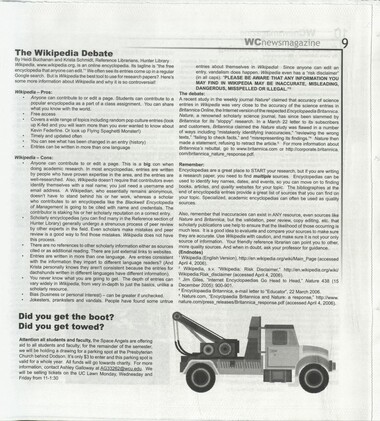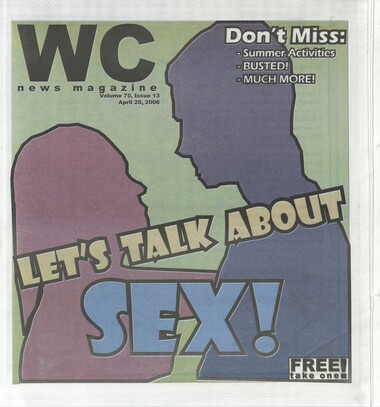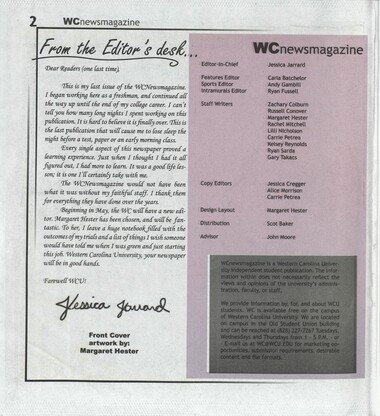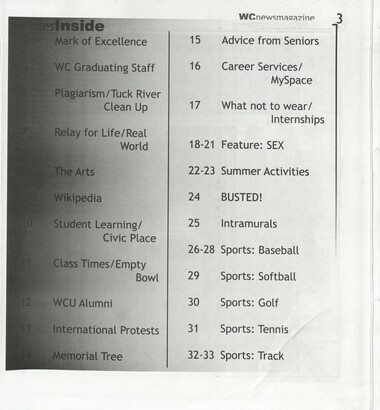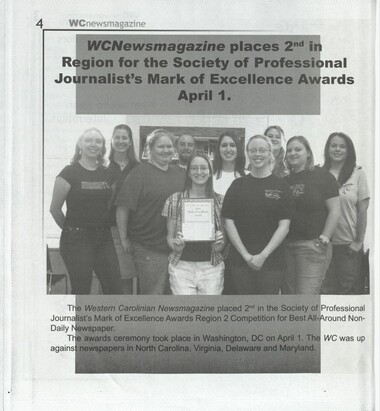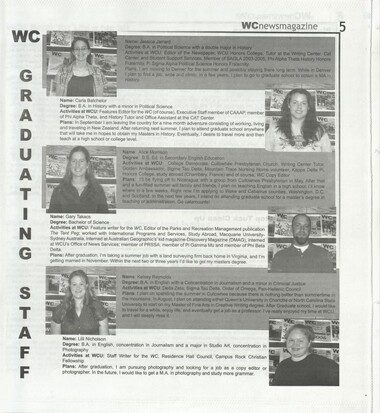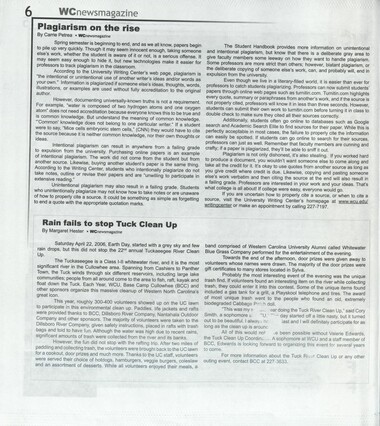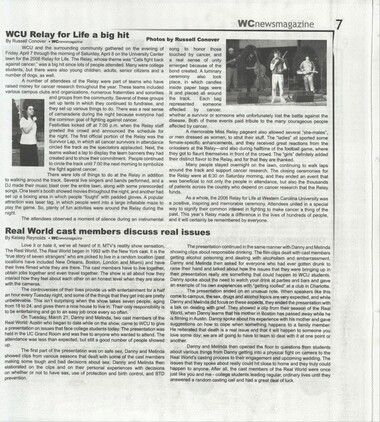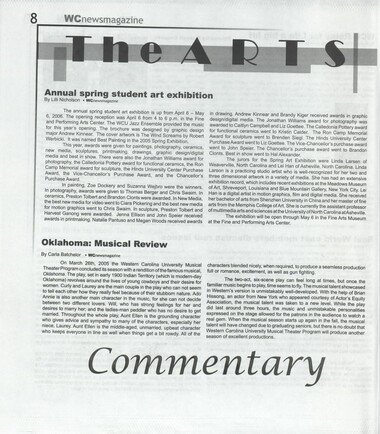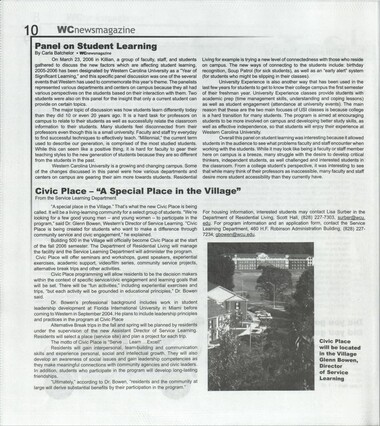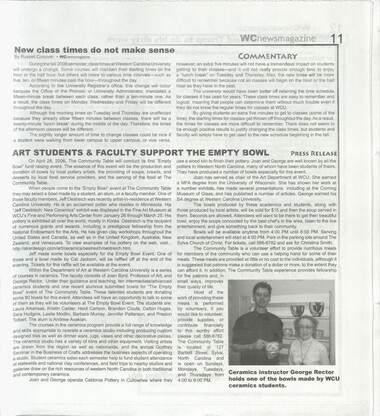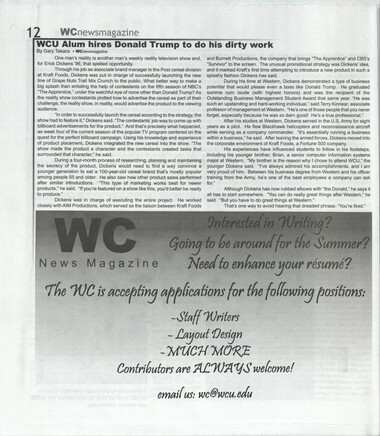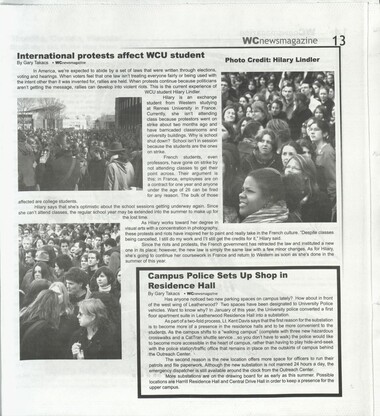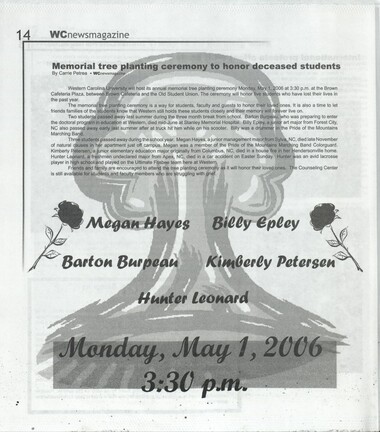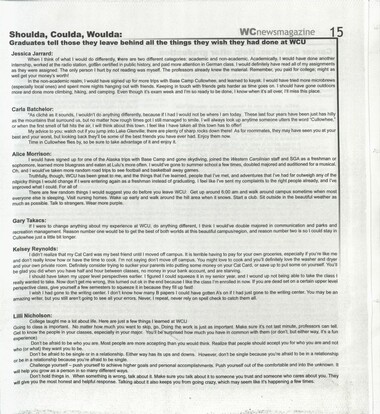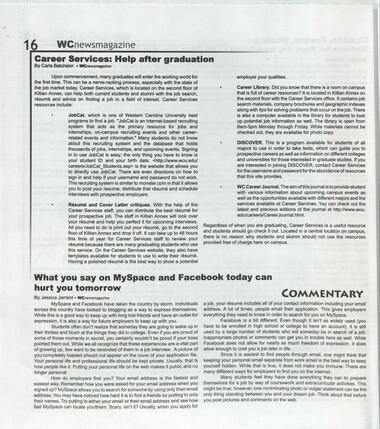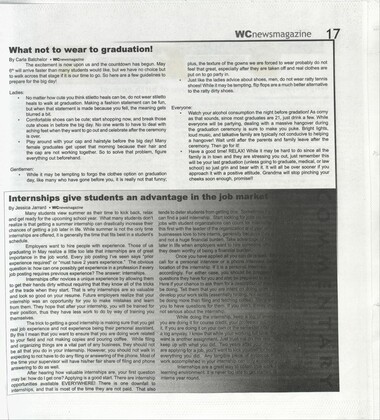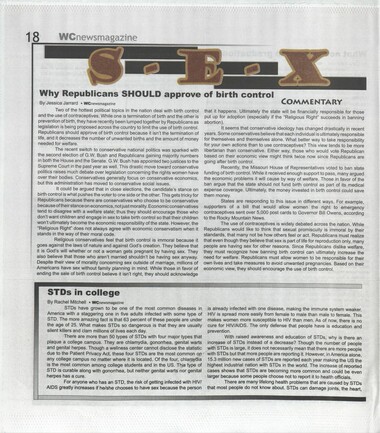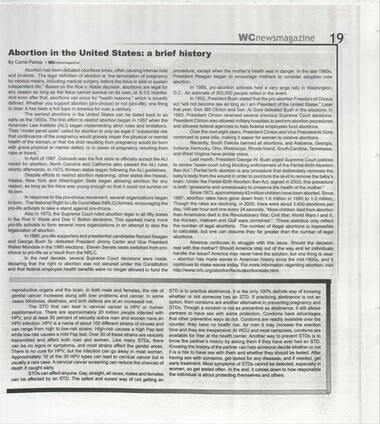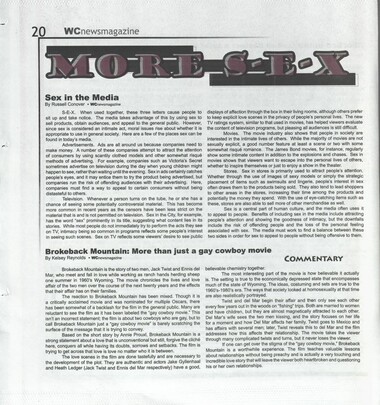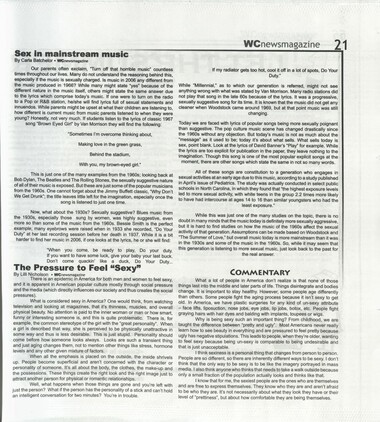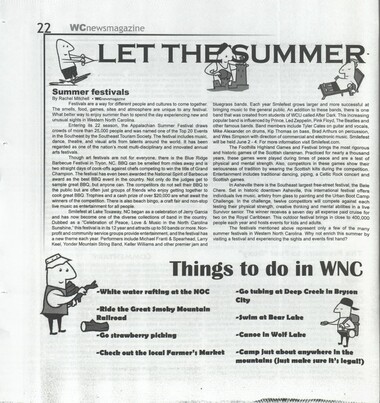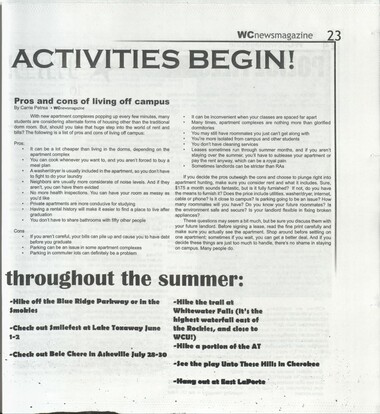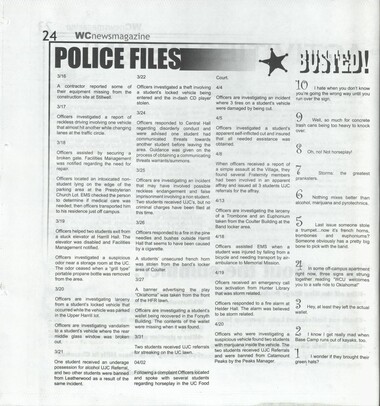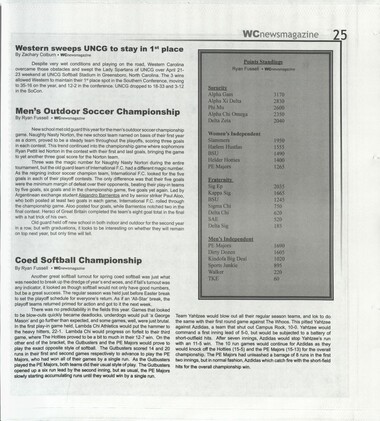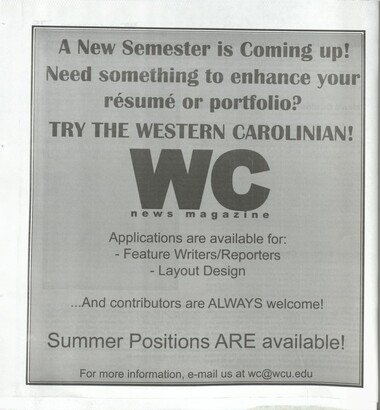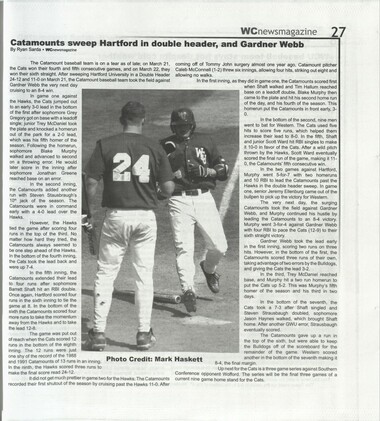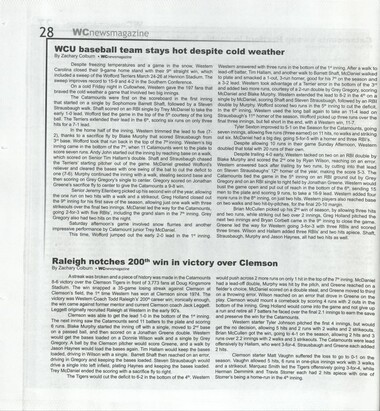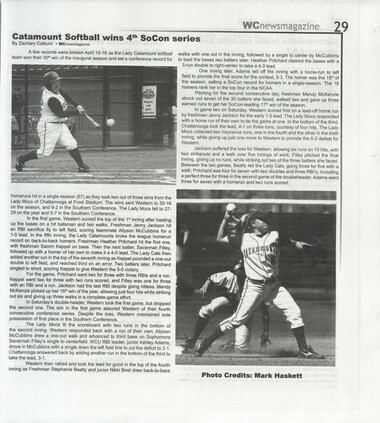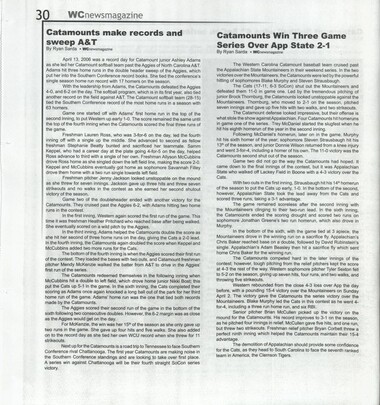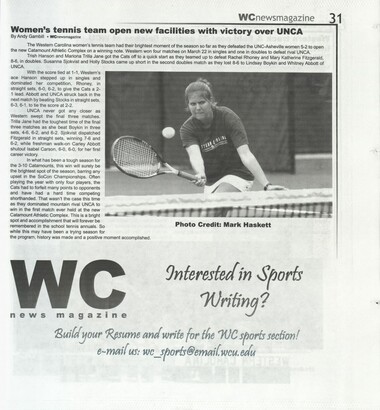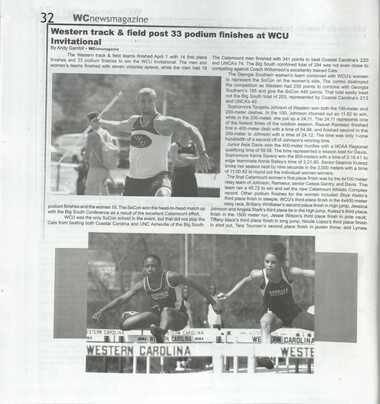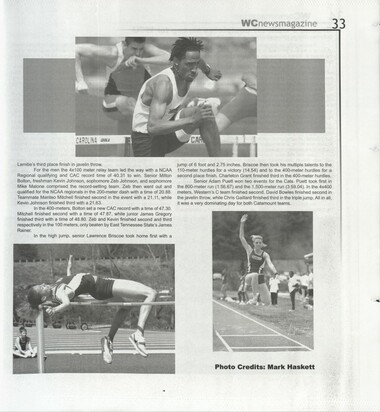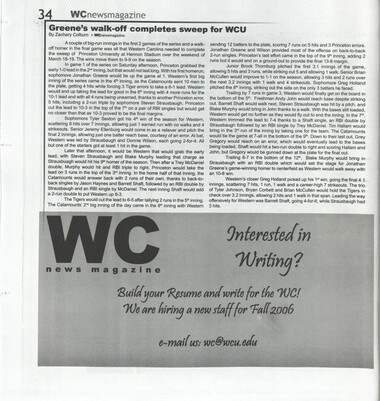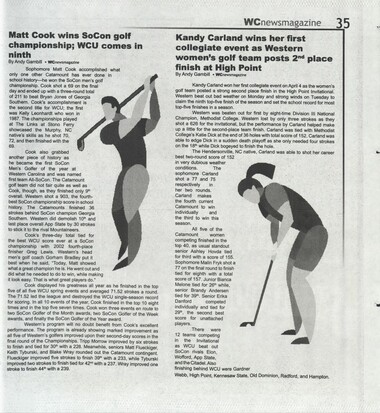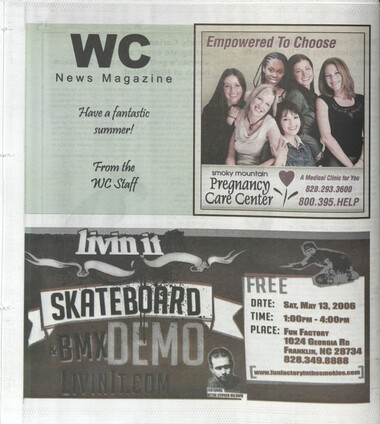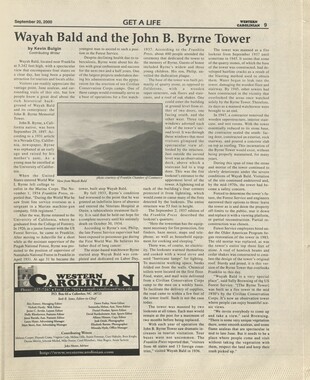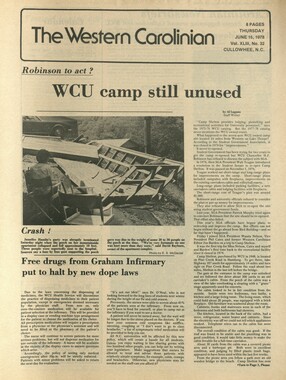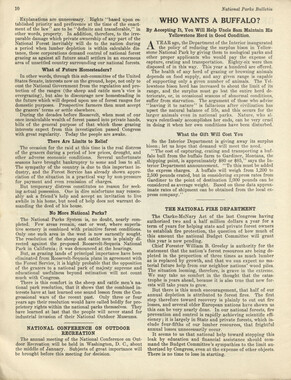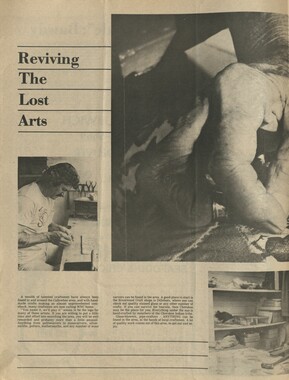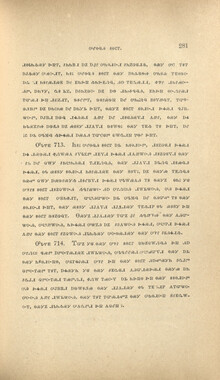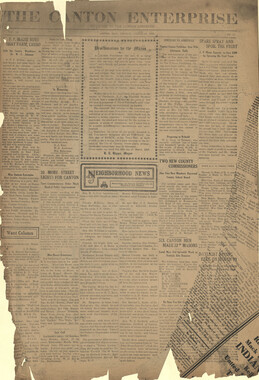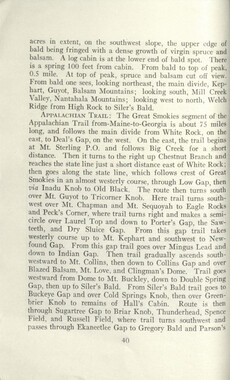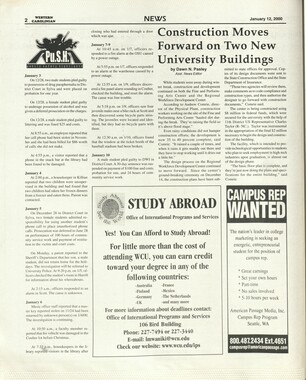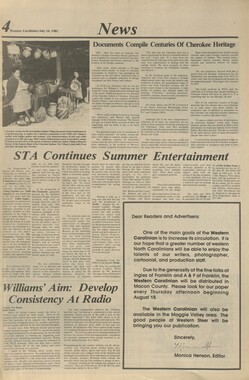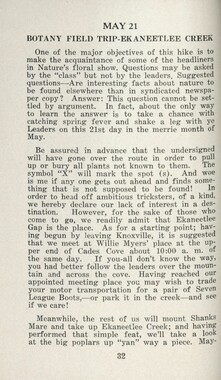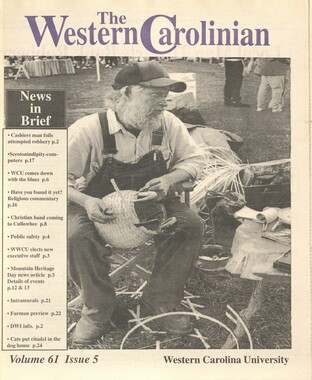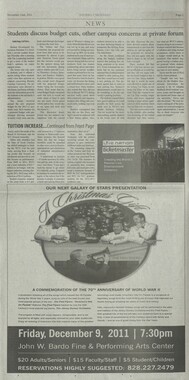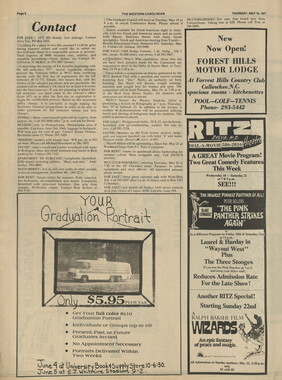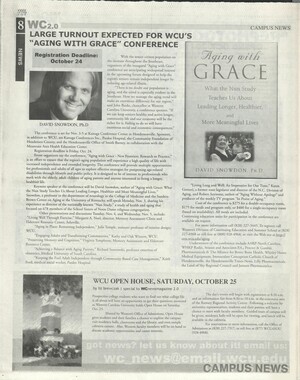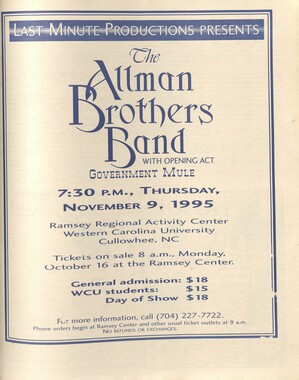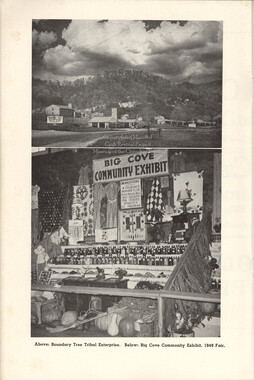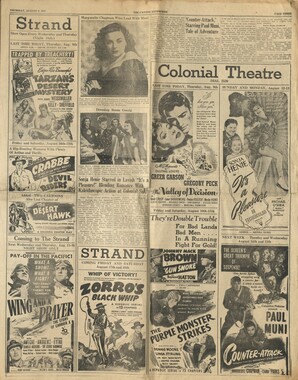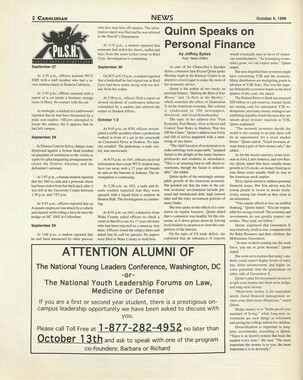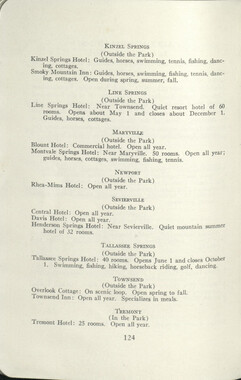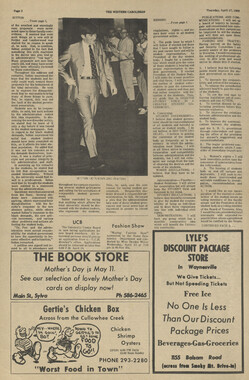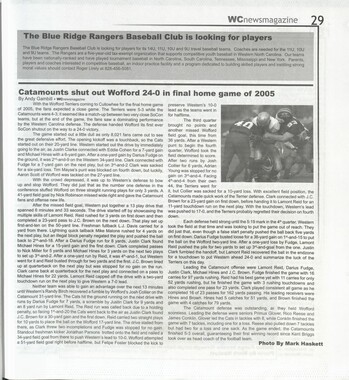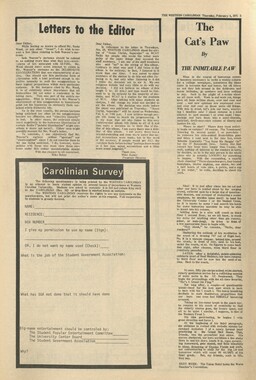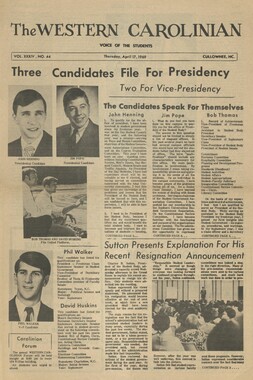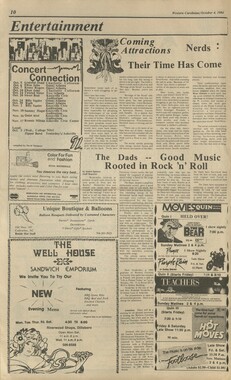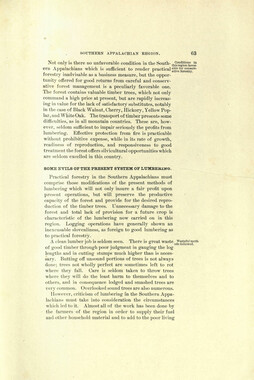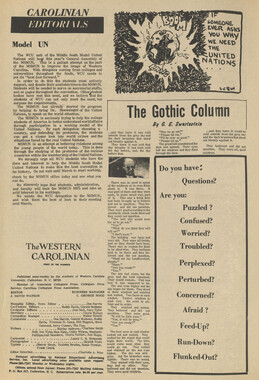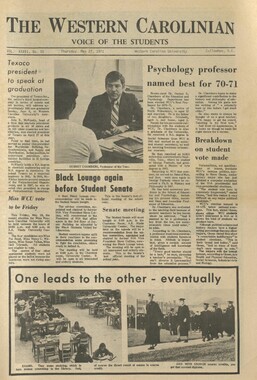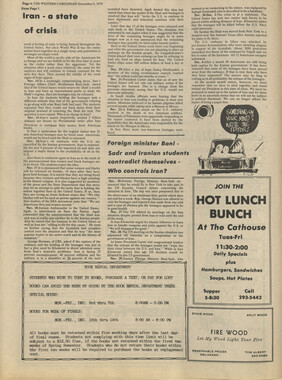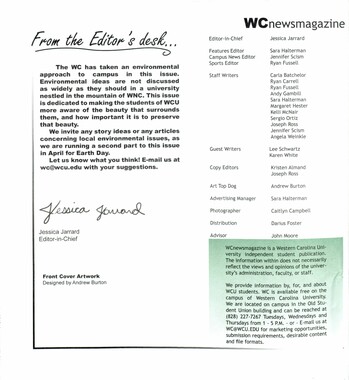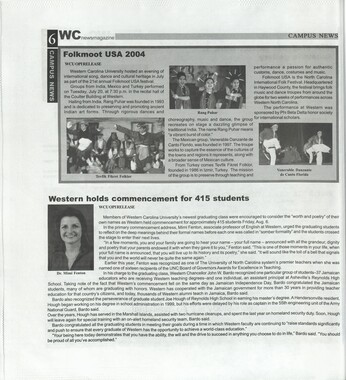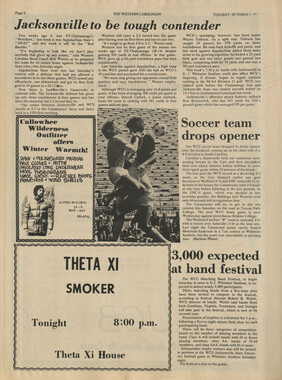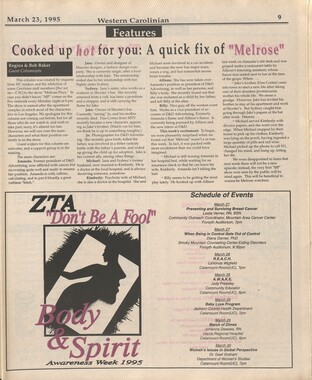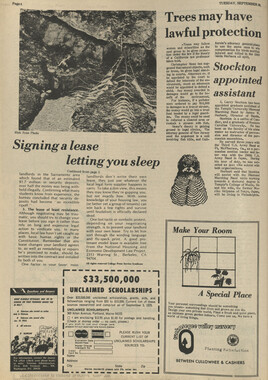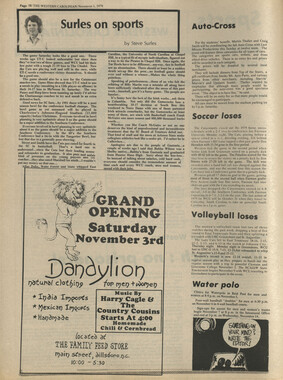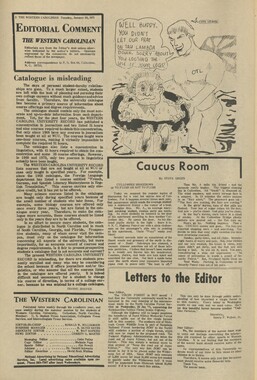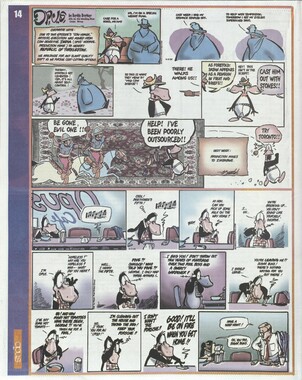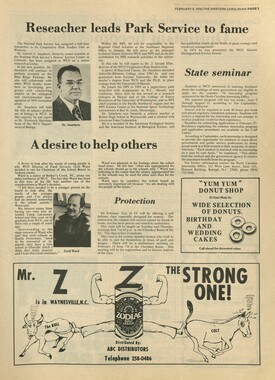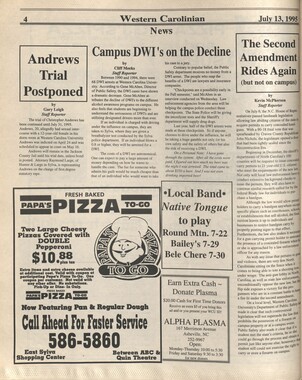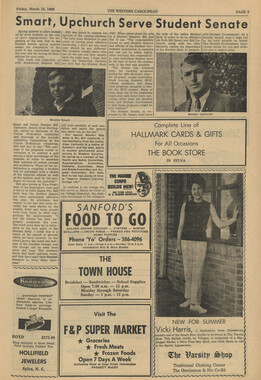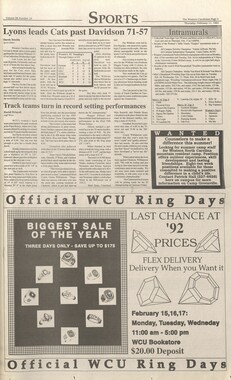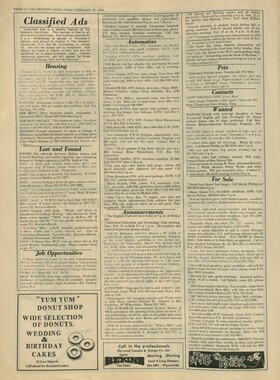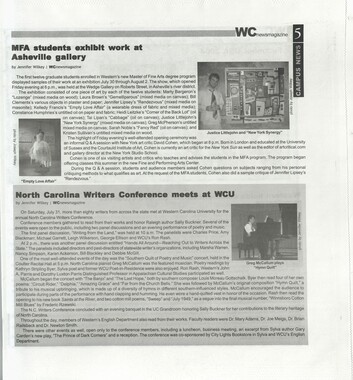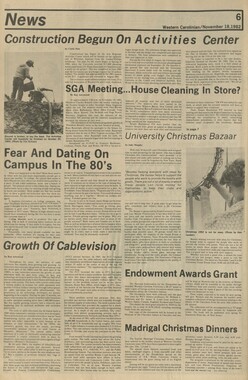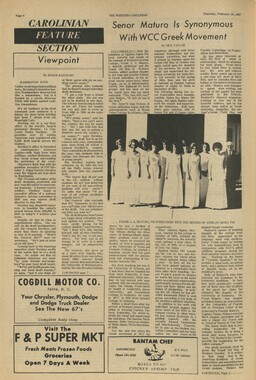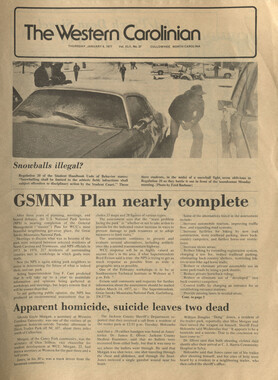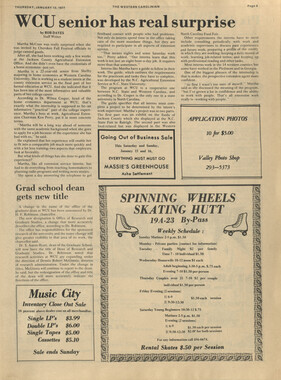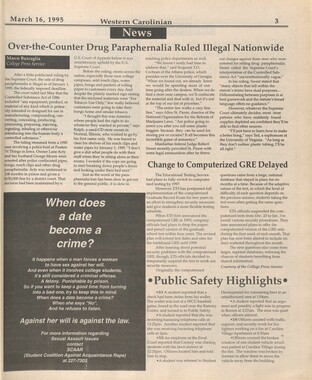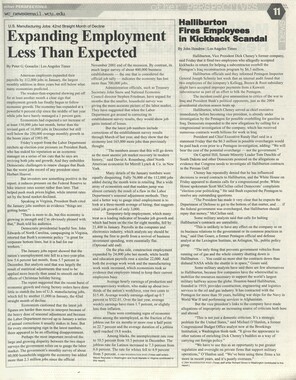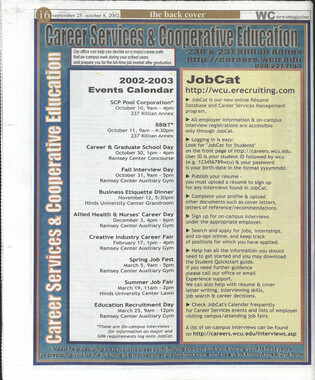Western Carolina University (21)
View all
- Canton Champion Fibre Company (2308)
- Cherokee Traditions (291)
- Civil War in Southern Appalachia (165)
- Craft Revival (1942)
- George Masa Collection (137)
- Great Smoky Mountains - A Park for America (3080)
- Highlights from Western Carolina University (422)
- Horace Kephart (998)
- Journeys Through Jackson (159)
- LGBTQIA+ Archive of Jackson County (90)
- Oral Histories of Western North Carolina (318)
- Picturing Appalachia (6617)
- Stories of Mountain Folk (413)
- Travel Western North Carolina (153)
- Western Carolina University Fine Art Museum Vitreograph Collection (129)
- Western Carolina University Herbarium (92)
- Western Carolina University: Making Memories (738)
- Western Carolina University Publications (2491)
- Western Carolina University Restricted Electronic Theses and Dissertations (146)
- Western North Carolina Regional Maps (71)
- World War II in Southern Appalachia (131)
University of North Carolina Asheville (6)
View all
- Allanstand Cottage Industries (62)
- Appalachian National Park Association (53)
- Bennett, Kelly, 1890-1974 (1463)
- Berry, Walter (76)
- Brasstown Carvers (40)
- Carver, George Washington, 1864?-1943 (26)
- Cathey, Joseph, 1803-1874 (1)
- Champion Fibre Company (233)
- Champion Paper and Fibre Company (297)
- Cherokee Indian Fair Association (16)
- Cherokee Language Program (22)
- Crowe, Amanda (40)
- Edmonston, Thomas Benton, 1842-1907 (7)
- Ensley, A. L. (Abraham Lincoln), 1865-1948 (275)
- Fromer, Irving Rhodes, 1913-1994 (70)
- George Butz (BFS 1907) (46)
- Goodrich, Frances Louisa (120)
- Grant, George Alexander, 1891-1964 (96)
- Heard, Marian Gladys (60)
- Kephart, Calvin, 1883-1969 (15)
- Kephart, Horace, 1862-1931 (313)
- Kephart, Laura, 1862-1954 (91)
- Laney, Gideon Thomas, 1889-1976 (439)
- Masa, George, 1881-1933 (61)
- McElhinney, William Julian, 1896-1953 (44)
- Niggli, Josephina, 1910-1983 (10)
- North Carolina Park Commission (105)
- Osborne, Kezia Stradley (9)
- Owens, Samuel Robert, 1918-1995 (11)
- Penland Weavers and Potters (36)
- Roberts, Vivienne (15)
- Roth, Albert, 1890-1974 (142)
- Schenck, Carl Alwin, 1868-1955 (1)
- Sherrill's Photography Studio (2565)
- Southern Highland Handicraft Guild (127)
- Southern Highlanders, Inc. (71)
- Stalcup, Jesse Bryson (46)
- Stearns, I. K. (213)
- Thompson, James Edward, 1880-1976 (226)
- United States. Indian Arts and Crafts Board (130)
- USFS (683)
- Vance, Zebulon Baird, 1830-1894 (1)
- Weaver, Zebulon, 1872-1948 (58)
- Western Carolina College (230)
- Western Carolina Teachers College (282)
- Western Carolina University (2008)
- Western Carolina University. Mountain Heritage Center (18)
- Whitman, Walt, 1819-1892 (10)
- Wilburn, Hiram Coleman, 1880-1967 (73)
- Williams, Isadora (3)
- Cain, Doreyl Ammons (0)
- Crittenden, Lorraine (0)
- Rhodes, Judy (0)
- Smith, Edward Clark (0)
- Appalachian Region, Southern (3032)
- Asheville (N.C.) (1945)
- Avery County (N.C.) (26)
- Blount County (Tenn.) (195)
- Buncombe County (N.C.) (1680)
- Cherokee County (N.C.) (283)
- Clay County (N.C.) (556)
- Graham County (N.C.) (238)
- Great Smoky Mountains National Park (N.C. and Tenn.) (535)
- Haywood County (N.C.) (3573)
- Henderson County (N.C.) (70)
- Jackson County (N.C.) (4926)
- Knox County (Tenn.) (35)
- Knoxville (Tenn.) (13)
- Lake Santeetlah (N.C.) (10)
- Macon County (N.C.) (421)
- Madison County (N.C.) (216)
- McDowell County (N.C.) (39)
- Mitchell County (N.C.) (135)
- Polk County (N.C.) (35)
- Qualla Boundary (982)
- Rutherford County (N.C.) (78)
- Swain County (N.C.) (2185)
- Transylvania County (N.C.) (270)
- Watauga County (N.C.) (12)
- Waynesville (N.C.) (86)
- Yancey County (N.C.) (72)
- Aerial Photographs (3)
- Aerial Views (60)
- Albums (books) (4)
- Articles (1)
- Artifacts (object Genre) (228)
- Bibliographies (1)
- Biography (general Genre) (2)
- Cards (information Artifacts) (38)
- Clippings (information Artifacts) (193)
- Copybooks (instructional Materials) (3)
- Crafts (art Genres) (622)
- Depictions (visual Works) (21)
- Design Drawings (1)
- Digital Moving Image Formats (2)
- Drawings (visual Works) (185)
- Envelopes (115)
- Exhibitions (events) (1)
- Facsimiles (reproductions) (1)
- Fiction (general Genre) (4)
- Financial Records (12)
- Fliers (printed Matter) (67)
- Glass Plate Negatives (381)
- Guidebooks (2)
- Internegatives (10)
- Interviews (823)
- Land Surveys (102)
- Letters (correspondence) (1070)
- Manuscripts (documents) (618)
- Maps (documents) (177)
- Memorandums (25)
- Minutes (administrative Records) (59)
- Negatives (photographs) (6090)
- Newsletters (1290)
- Newspapers (2)
- Notebooks (8)
- Occupation Currency (1)
- Paintings (visual Works) (1)
- Pen And Ink Drawings (1)
- Periodicals (194)
- Personal Narratives (10)
- Photographs (12977)
- Plans (maps) (1)
- Poetry (6)
- Portraits (4568)
- Postcards (329)
- Programs (documents) (181)
- Publications (documents) (2444)
- Questionnaires (65)
- Relief Prints (26)
- Sayings (literary Genre) (1)
- Scrapbooks (282)
- Sheet Music (2)
- Slides (photographs) (402)
- Songs (musical Compositions) (2)
- Sound Recordings (802)
- Specimens (92)
- Speeches (documents) (18)
- Tintypes (photographs) (8)
- Transcripts (329)
- Text Messages (0)
- A.L. Ensley Collection (275)
- Appalachian Industrial School Records (7)
- Appalachian National Park Association Records (336)
- Axley-Meroney Collection (2)
- Bayard Wootten Photograph Collection (20)
- Bethel Rural Community Organization Collection (7)
- Blumer Collection (5)
- C.W. Slagle Collection (20)
- Canton Area Historical Museum (2110)
- Carlos C. Campbell Collection (462)
- Cataloochee History Project (64)
- Cherokee Studies Collection (4)
- Daisy Dame Photograph Album (5)
- Daniel Boone VI Collection (1)
- Doris Ulmann Photograph Collection (112)
- Elizabeth H. Lasley Collection (1)
- Elizabeth Woolworth Szold Fleharty Collection (4)
- Frank Fry Collection (95)
- George Masa Collection (173)
- Gideon Laney Collection (452)
- Hazel Scarborough Collection (2)
- Hiram C. Wilburn Papers (28)
- Historic Photographs Collection (236)
- Horace Kephart Collection (861)
- Humbard Collection (33)
- Hunter and Weaver Families Collection (1)
- I. D. Blumenthal Collection (4)
- Isadora Williams Collection (4)
- Jesse Bryson Stalcup Collection (47)
- Jim Thompson Collection (224)
- John B. Battle Collection (7)
- John C. Campbell Folk School Records (80)
- John Parris Collection (6)
- Judaculla Rock project (2)
- Kelly Bennett Collection (1482)
- Love Family Papers (11)
- Major Wiley Parris Civil War Letters (3)
- Map Collection (12)
- McFee-Misemer Civil War Letters (34)
- Mountain Heritage Center Collection (4)
- Norburn - Robertson - Thomson Families Collection (44)
- Pauline Hood Collection (7)
- Pre-Guild Collection (2)
- Qualla Arts and Crafts Mutual Collection (12)
- R.A. Romanes Collection (681)
- Rosser H. Taylor Collection (1)
- Samuel Robert Owens Collection (94)
- Sara Madison Collection (144)
- Sherrill Studio Photo Collection (2558)
- Smoky Mountains Hiking Club Collection (616)
- Stories of Mountain Folk - Radio Programs (374)
- The Reporter, Western Carolina University (510)
- Venoy and Elizabeth Reed Collection (16)
- WCU Gender and Sexuality Oral History Project (36)
- WCU Mountain Heritage Center Oral Histories (25)
- WCU Oral History Collection - Mountain People, Mountain Lives (71)
- WCU Students Newspapers Collection (1923)
- Western North Carolina Tomorrow Black Oral History Project (69)
- William Williams Stringfield Collection (2)
- Zebulon Weaver Collection (109)
- African Americans (390)
- Appalachian Trail (35)
- Artisans (521)
- Cherokee art (84)
- Cherokee artists -- North Carolina (10)
- Cherokee language (21)
- Cherokee pottery (101)
- Cherokee women (208)
- Church buildings (190)
- Civilian Conservation Corps (U.S.) (111)
- College student newspapers and periodicals (2012)
- Dams (108)
- Dance (1023)
- Education (222)
- Floods (63)
- Folk music (1015)
- Forced removal, 1813-1903 (2)
- Forest conservation (220)
- Forests and forestry (1198)
- Gender nonconformity (4)
- Great Smoky Mountains National Park (N.C. and Tenn.) (181)
- Hunting (47)
- Landscape photography (25)
- Logging (122)
- Maps (83)
- Mines and mineral resources (9)
- North Carolina -- Maps (18)
- Paper industry (38)
- Postcards (255)
- Pottery (135)
- Railroad trains (72)
- Rural electrification -- North Carolina, Western (3)
- School integration -- Southern States (2)
- Segregation -- North Carolina, Western (5)
- Slavery (5)
- Sports (452)
- Storytelling (243)
- Waterfalls -- Great Smoky Mountains (N.C. and Tenn.) (66)
- Weaving -- Appalachian Region, Southern (280)
- Wood-carving -- Appalachian Region, Southern (328)
- World War, 1939-1945 (174)
Western Carolinian Volume 70 Number 13
Item
Item’s are ‘child’ level descriptions to ‘parent’ objects, (e.g. one page of a whole book).
-
-
The Wikipedia Debate By Heidi Buchanan and Krista Schmidt, Reference Librarians, Hunter ibrary Wikipedia, www.wikipedia.org, is an online encyclopedia. Its tagline is the free encyclopedia that anyone can edit. We often see its entries come up in a regular Google search. But is Wikipedia the best tool to use for research papers? Here's some more information about Wikipedia and why it is so controversial! Wikipedia - Pros: + Anyone can contribute to or edit a page. Students can contribute to a Popular encyclopedia as a part of a class assignment. You can share what you know with the world, + Free access * Covers a wide range of topios including random pop culture entries (look up K-fed and you will learn more than you ever wanted to know about Kevin Federtine. Or look up Flying Spaghetti Monster!) + Timely and updated often + You can see what has been changed in an entry (history) + Entries can be written in more than one language Wikipedia - Cons: + Anyone can contribute to or edit a page. This is a big con when doing academic research, in most encyclopedias, entries are written by people who have proven expertise in the area, and the entries are well-researched. Also, Wikipedia doesn't require that contributors even identify themselves with a teal name; you just need a usemame and email address. A Wikipedian, who essentially remains anonymous, doesn't have to stand behind his or her work, whereas a scholar who contributes to an encyclopedia like the Blackwell Encyclopedia of Management is going to be cited with name and credentials. The Contributor is staking his or her scholarly reputation on a correct entry. + Scholarly encyclopedias (you can find many in the Reference section of Hunter Library) generally undergo a strenuous process of peer review by other experts in the field. Even scholars make mistakes and peer review is a good way to find those mistakes. Wikipedia does not have this process. + There are no references to other scholarly information either as sources cited or as additional reading. There are just extemal links to websites. * Entries are written in more than one language. Are entries consistent with the information they impart to different language readers? (And Krista personally knows they aren't consistent because the entries for dachshunds written in different languages have different information). + You never know what you are going to get. The depth of entries can vary widely in Wikipedia, from very in-depth to just the basics, unlike a scholarly resource, + Bias (business or personal interest) ~ can be greater if unchecked, + dokesters, pranksters and vandals. People have found some untrue Did you get the boot? Did you get towed? Attention all students and faculty, the Space Angels are offering aid to all students and faculty; for the remainder of the semester, we will be holding a drawing for a parking spot at the Presbyterian Church behind Dodson. It's only $3 to enter and this parking spot is valid for a whole year. All funds will go towards charity. For more information, contact Ashley Galloway at AG33262@wcu,edu. We will be selling tickets on the UC Lawn Monday, Wednesday and Friday from 11-1:30 WCnewsmagazine entries about themselves in Wikipedial Since anyone can edit an entry, vandalism does happen. Wikipedia even has a risk disclaimer" {in all caps): PLEASE BE AWARE THAT ANY INFORMATION YOU MAY FIND IN WIKIPEDIA MAY BE INACCURATE, MISLEADING, DANGEROUS, MISSPELLED OR ILLEGAL.? The debate: A recent study in the weekly journal Nature claimed that accuracy of science entries in Wikipedia was very close to the accuracy of the science entries in Britannica Online, the Internet version of the respected Encyclopaedia Britannica. Nature, a renowned scholarly science journal, has since been slammed by Britannica for its "sloppy" research. In a March 22 letter to its subscribers and customers, Britannica claimed the Nature study was flawed in a number of ways including mistakenly identifying inaccuracies, reviewing the wrong texts, falling to check facts, and "misrepresenting its findings." Nature then made a statement, refusing to retract the article. For more information about Britannicas rebuttal, go to. www.britannica.com or http://corporate.britannica, com/britannica_nature_response.paf. Remember: Encyclopedias are a great place to START your research, but if you are writing @ research paper, you need to find multiple sources. Encyclopedias can be used to identify key names, dates, and events, so you can move on to finding books, articles, and quality websites for your topic. The bibliographies at the end of encyclopedia entries provide a great list of sources that you can find on your topic. Specialized, academic encyclopedias can often be used as quality sources. Also, remember that inaccuracies can exist in ANY resource, even sources like Nature and Britannica, but the validation, peer review, copy editing, etc. that scholarly publications use help to ensure that the likelihood of those occurring is much less. Itis a good idea to evaluate and compare your sources to make sure they are accurate. Use Wikipedia with caution, and make sure itis not your only source of information. Your friendly reference librarian can point you to other, more quality sources. And when in doubt, ask your professor for guidance. (Endnotes) * Wikipedia (English Version), http:/en.wikipedia.org/wiki/Main_Page (accessed April 4, 2006). 2 Wikipedia, s.v. "Wikipedia: Risk Disclaimer," http://en.wikipedia.org/wiki! Wikipedia:Risk_disclaimer (accessed April 4, 2006). Jim Giles, Intemet Encyclopaedias Go Head to Head, Nature 438 (15 December 2005): 900-901. Encyclopaedia Britannica, e-mail letter to Educator, 22 March 2006. Nature.com, "Encyclpaedia Britannica and Nature: a response, http://www. Nature. comipress_releases/Britannica_response.pdf (accessed April 4, 2006). |
Object
Object’s are ‘parent’ level descriptions to ‘children’ items, (e.g. a book with pages).
-
The Western Carolinian is Western Carolina University's student-run newspaper. The paper was published as the Cullowhee Yodel from 1924 to 1931 before changing its name to The Western Carolinian in 1933.
-
